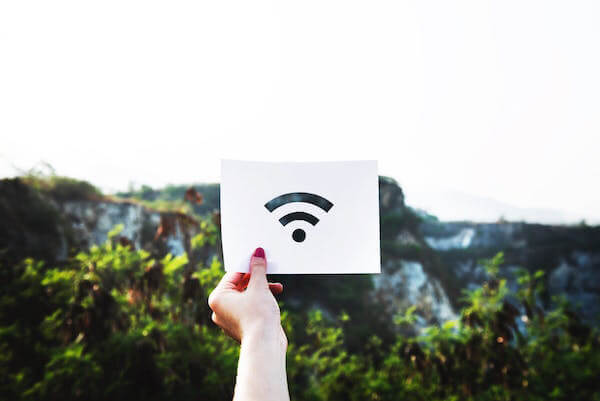WiFi and the electronic devices that connect to it, such as cellphones, laptops, and wireless headphones, are all around us. So far, there is no consistent evidence that WiFi routers or WiFi-powered devices increase cancer risk.
What is WiFi?
WiFi uses radio waves to provide network connectivity. Devices that use WiFi have a wireless adapter that translates data sent into a radio signal. This signal is then transmitted to a decoder, known as the router. WiFi operates in similar frequencies as microwaves and cellphones, in the 2 to 5 GHz range.
WiFi and radiation
Wireless networks stream invisible radio waves, a form of radiofrequency radiation (EMFs), through the air — similar to cellphones, computers, Bluetooth speakers, and other WiFi-powered devices.

The concern around WiFi and routers causing cancer is due to the emission of these EMFs. These are invisible areas of energy that are produced by electricity and are often referred to as radiation. There are two types of EMFs: ionizing and non-ionizing. Ionizing radiation is “high-level radiation, which is has the potential for cellular and DNA damage.” Some forms of this type of EMF include ultraviolet (UV) rays and X-rays.
Non-ionizing EMF is low-level radiation which is generally viewed as harmless. Routers and electronic devices, such as cellphones, computers and laptops, and Bluetooth devices (such as wireless headphones) emit this type of radiation. The main concern regarding this type of EMF is although it is low-frequency, electronic devices are all around us, and always on.
When it comes to wireless routers, it is often assumed that they are always sending and receiving information, but these devices transmit just 0.1% of the time.
Is WiFi harmful to my health? Are there harmful effects of sitting next to a WiFi modem?
When your WiFi router transmits data, it emits EMFs that the body can absorb. The greater the distance you put between yourself and your router, the less radiation your body encounters.
The amount of radiation absorbed from a wireless router is minor compared to the EMFs transmitted from taking a call on a cellphone. Your cellphone exposes the area of the body to which it is held (the ear or head) to the energy given from EMFs and other factors. Although there is direct exposure to the skin, non-ionizing radiation can’t damage DNA or cells directly, like ionizing radiation can.
Can WiFi cause cancer?
So far, there is no consistent evidence that WiFi routers or WiFi-powered devices increase cancer risk. Despite low-frequency EMFs being classified as possibly carcinogenic, researchers have not observed a direct connection between these devices and cancer. The best way to protect yourself from radiation emissions from routers and electronic devices is to minimize exposure.
About the Medical Reviewer

David Kozono, MD, PhD, is a board certified radiation oncologist who specializes in the treatment of thoracic malignancies including lung cancer. His career goal is to improve treatment for patients with these cancers through basic, translational and clinical investigation. He graduated in 2005 from the Johns Hopkins University School of Medicine with an MD and a PhD in Biochemistry, Cellular and Molecular Biology, which he obtained studying under Nobel Laureate Dr. Peter Agre. In 2006, he completed an internship in internal medicine at Brigham and Women’s Hospital, and in 2010, he graduated from the Harvard Radiation Oncology Program. Upon graduation, he joined the Department of Radiation Oncology at the Dana-Farber/Brigham and Women’s Cancer Center, where he is a full-time clinician and researcher.

I have read that we should be concerned about 5G. What do you think?
Thank you for reading. Due to the high volume of comments we receive, we are usually unable to respond to each person individually. If you have a specific medical question related to this blog post, we would recommend talking to your doctor or other care provider. We’ve also gathered answers to some of the more frequent questions below:
-For more information on a particular type of cancer or the latest updates we have available, please visit our website (https://www.dana-farber.org/) or search our blog by clicking the magnifying glass at the top of our homepage: https://blog.dana-farber.org/insight/
-For information on whether you would be eligible for a certain treatment, please visit our website for more information on how to make an appointment or get an online second opinion: https://www.dana-farber.org/appointments-and-second-opinions/
-For information on clinical trials available at Dana-Farber and elsewhere, please visit the Dana-Farber database: https://www.dana-farber.org/research/clinical-trials/find-a-clinical-trial/. For clinical trials outside of Dana-Farber: http://www.clinicaltrials.gov.
Wishing you all the best,
Dana-Farber Insight team
I see so much brain cancer this year. I always wondered about this.